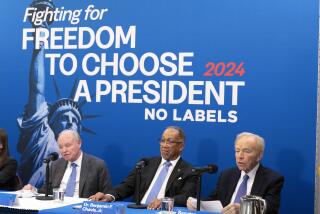McCain Defends Letters Sent on Donors’ Behalf
WASHINGTON — Sen. John McCain, the top-tier Republican presidential hopeful who has made political reform a centerpiece of his candidacy, sought Saturday to defuse the first ethics controversy of his campaign by authorizing the release of letters he had written to federal regulators on behalf of a wide array of supporters and constituents.
McCain aides released more than 500 letters sent over the last three years and said the senator will ask federal agencies Monday to release all correspondence he has sent during his 12 years as a U.S. senator from Arizona. McCain, who has been gaining on Texas Gov. George W. Bush, has challenged his rivals to release letters they have sent on behalf of their contributors.
Most Letters Were Courtesy Referrals
The overwhelming majority of McCain’s letters were what congressional staffers call “bumps”: courtesy referrals to various agencies of often-minor complaints lodged by constituents. However, his aides acknowledged that at least 14 letters directly concerned campaign donors to McCain, who a decade ago endured his most intense political crisis as one of five senators who met with federal banking regulators on behalf of former Arizona savings and loan executive Charles H. Keating Jr.
McCain, who is chairman of the Senate Commerce Committee, on Saturday continued to insist that his newest letters--some written as recently as two months ago--were intended solely to encourage prompt decisions from federal bureaucracies, not to get decisions favorable to campaign backers.
“All the times when I have weighed in, I have asked them to do their duty and to expedite the procedures,” McCain told reporters aboard his campaign bus in South Carolina. “I will continue to do that job. . . . If people view [these letters] in their entirety, they can see I’ve acted on behalf of the consumer and tried to get a bureaucracy known for its inefficiency to act.”
He appeared to suggest that he is being held to a standard higher than that applied to other members of Congress, most if not all of whom write federal offices on behalf of constituents or donors.
“Take a look at what other congressmen and senators do,” said McCain, adding: “What is the standard and am I acting in higher standard? I think so.”
Indeed, McCain’s writing of any such letters, first reported last week by the Boston Globe, has invited criticism precisely because he calls for higher ethical standards, starting with overhauling the way federal campaigns are financed.
For years, McCain has fought unsuccessfully for drastic changes in the campaign laws, including banning the huge “soft money” contributions to political party committees. Many political contributors have interests directly affected by votes in Congress or actions taken by federal agencies. McCain argues that, until the system is changed, officials--including himself--will be tainted by the perception that the contributions unduly influence government decisions.
It is against this backdrop that McCain is now defending the many letters he has sent to federal agencies, especially those involving interests that have contributed to his campaigns.
When McCain wrote in November and December to the Federal Communications Commission, he did so on behalf of one of his campaign contributors who was involved in a dispute over television licenses in Pittsburgh. Executives and lobbyists affiliated with the communications company owner, Lowell “Bud” Paxson, have given $20,000 to McCain’s campaign. Paxson also allowed McCain’s presidential campaign to lease his corporate jet at a rate lower than that of a typical charter.
Late last month the FCC voted, 3 to 2, to allow the transfer of stations in Pittsburgh, granting Paxson, whose company is based in West Palm Beach, Fla., the outcome he sought.
McCain aides released campaign finance records Saturday to discredit criticism from FCC Chairman William E. Kennard. The documents indicate Kennard, an appointee of President Clinton, gave $1,000 to Vice President Al Gore’s campaign last March.
Letters Sent on Behalf of Business Interests
The correspondence released Saturday shows that McCain has not hesitated on numerous other occasions to push regulatory officials whose decisions can be worth millions of dollars in revenue to business interests.
The senator wrote letters on behalf of such concerns as America West Airlines, which was seeking approval to offer service out of the Flagstaff, Ariz., airport. McCain also wrote letters concerning BellSouth, which was trying to expand into long-distance service, and Ameritech, a firm trying to merge with SBC Communications, another so-called Baby Bell.
Last May, two weeks after Ameritech Chairman Richard Notebaert held a fund-raiser for McCain, the senator wrote the FCC, accusing regulators of “applying a different, and much stricter, burden of proof in this merger proceeding than the commission has applied in evaluating other mergers.”
The FCC approved the merger of Ameritech and SBC last year. The commission rejected BellSouth’s bid to enter the long-distance business within Louisiana.
Questioned about the matter during a GOP debate Friday night, McCain said: “All the times when I have weighed in, I have asked them to do their duty and to expedite the procedures as they’re laid out under the law and according to existing regulations.”
*
Willman reported from Washington and O’Connor from Columbia, S.C.
More to Read
Get the L.A. Times Politics newsletter
Deeply reported insights into legislation, politics and policy from Sacramento, Washington and beyond. In your inbox three times per week.
You may occasionally receive promotional content from the Los Angeles Times.











